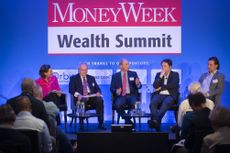Five books to put on your Christmas list
Even if they’ve done nothing else, lockdowns – in whatever guise – have given us plenty of time to read. Merryn Somerset Webb picks five books to enjoy over the festive period and beyond.


Fed up with the seemingly endless cycle of lockdown and release in the UK at the moment? Spare a thought for residents of Newark during the first English Civil War.
The Royalist town found itself besieged three times between 1642 and 1646, once for a month, once for four and once for five. While in the last period of what we might see as a super extreme lockdown, the residents of Newark did some of the same things we’ve been doing for the past 12 months. Most interestingly, they got creative with money: having lost access to the country’s currency, they minted their own. Local nobles were persuaded to give up their silver plates, cups and cutlery, which were minted into rough, diamond-shaped coins that were then declared to be of various values and used to pay soldiers and the like.
We aren’t quite making coins in our kitchens – but we are also showing significant imagination when it comes to the creation and use of money: we are banishing cash; building a new bubble in bitcoin; and, crucially, barely noticing as our governments drive fast money supply growth by guaranteeing bank loans.
Subscribe to MoneyWeek
Subscribe to MoneyWeek today and get your first six magazine issues absolutely FREE

Sign up to Money Morning
Don't miss the latest investment and personal finances news, market analysis, plus money-saving tips with our free twice-daily newsletter
Don't miss the latest investment and personal finances news, market analysis, plus money-saving tips with our free twice-daily newsletter
Money: The True Story of A Made-Up Thing
By Jacob Goldstein
Buy on Amazon here
Both cases – Newark and now – tell you the same story: if everyone agrees a thing is money – be it bits of someone else’s old forks or some numbers on a screen – it is money. For more on how this psychological trick works, the first book in the pile you will be giving to someone else at Christmas in order to take back and read later, should be Jacob Goldstein’s Money: The True Story of A Made-Up Thing.
It misses out Newark. But that apart, as we get ready for a new wave of state-backed money creation and the consequent inflation, it’s well worth reading. As Goldstein says, money constantly changes. “The way we do money will look as strange to our great grandchildren as a world where banks print their own paper money with pictures of Santa Claus.”
As an aside, if you want to give a genuinely valuable inflation-hedging gift perhaps seek out one of the surviving Newark coins. They are scarce, genuinely interesting (you can still spot bits of cutlery decoration on some of them), and made (mostly) of precious metal. Perfect.
On the subject of the coming inflation, I’d like to point to an older book that celebrates how, in part, we are going to get there. I had been considering Kate Humble’s A Year of Living Simply for this column. There’s something very worthy about trying to live without stuff – and something very charming about the idea that the pandemic has taught us all the joys of buying fewer complicating possessions. It’s just that I suspect lockdown has actually taught us something else – that money burns holes in our pockets fast.
Against Thrift: Why Consumer Culture is good for the Economy, the Environment and Your Soul
By James Livingston
We love to consume. Why else would retail sales in the UK have risen 5.8% year-on-year in October? Quite. So no Humble. Instead, to help you feel good about what you are about to do (spend, spend, spend) turn to James Livingston’s 2011 book, Against Thrift: Why Consumer Culture is good for the Economy, the Environment and Your Soul. His argument boils down to the basic point that it is consumption that drives economies.
Policy should therefore ignore the “New Puritans” and be directed towards encouraging this above all else (in the main via higher wages). Obsessed as I am by saving for my pension, I’m not entirely convinced, but our governments presumably are, given the way they are shovelling cash directly into people’s pockets and the way in which that will drive next year’s economic boom.
The 99% Invisible City: A Field Guide to the Hidden World of Everyday Design
By Roman Mars and Kurt Kohlstedt
While we are celebrating things we have temporarily lost, it is time to look for the marvellous in our great cities, something else we keep being told, wrongly, that we have fallen out of love with. So get The 99% Invisible City: A Field Guide to the Hidden World of Everyday Design by Roman Mars and Kurt Kohlstedt. You’ll immediately be in a rush to get to New York to notice for yourself the various coloured markings on the sidewalks: blue tells you there is potable water below; orange that there is network infrastructure. Not just the history of design, but the history of progress too.
Extraordinary Popular Delusions and the Madness of Crowds
By Charles MacKay
Next, on the subject of group think and general hysteria, your own pre-Christmas reading should include Charles MacKay’s Extraordinary Popular Delusions and the Madness of Crowds.
If you are anything in the City, you will think you have read it. Mostly, you probably have not. You may have skimmed the chapters on The South Sea Bubble and Tulipmania for nice quotes for your research notes. This time, ignore those and read about the mass hysterias behind the Crusades, when it was said that “a grove of 100 oaks would not have furnished all the wood sold in little morsels as remnants of the true cross”. Or delve into the witch-hunting manias of the 1600s – the horse shoes you sometimes see above English doors are the remnants of protection from witches – and the regular recycling of end-of-the-world terrors.
You may particularly enjoy the apocalypticism of 1630s plague-ridden Milan in which “everything was believed to have been poisoned by the devil . . . all objects of touch were poisoned, the walls of the houses. and the very handles of the doors”. This should give you plenty of lunchtime ammunition for a three-household row about the efficacy or not of government lockdown policy over Christmas lunch.
Investing for Growth, How to Make Money by Only Buying the Best Companies in the World
By Terry Smith
Finally an investment book. This year it has to be Terry Smith’s Investing for Growth, How to Make Money by Only Buying the Best Companies in the World, a collection of his writing over the decade since he launched his flagship Fundsmith Equity Fund.
Fundsmith is up well over 400% since its launch, against under 200% for the MSCI World Index. I could dispute something on around half of Smith’s pages – we’ve been bickering about fees for at least a decade. But I hugely admire his concentrated conviction-led, growth-focused approach, and, oh yes, his fund has done wonders for my self-invested personal pension. So I’m still reading every page.
• This article was first published in the Financial Times
Merryn Somerset Webb started her career in Tokyo at public broadcaster NHK before becoming a Japanese equity broker at what was then Warburgs. She went on to work at SBC and UBS without moving from her desk in Kamiyacho (it was the age of mergers).
After five years in Japan she returned to work in the UK at Paribas. This soon became BNP Paribas. Again, no desk move was required. On leaving the City, Merryn helped The Week magazine with its City pages before becoming the launch editor of MoneyWeek in 2000 and taking on columns first in the Sunday Times and then in 2009 in the Financial Times
Twenty years on, MoneyWeek is the best-selling financial magazine in the UK. Merryn was its Editor in Chief until 2022. She is now a senior columnist at Bloomberg and host of the Merryn Talks Money podcast - but still writes for Moneyweek monthly.
Merryn is also is a non executive director of two investment trusts – BlackRock Throgmorton, and the Murray Income Investment Trust.
-
 Coventry Building Society bids £780m for Co-operative Bank - what could it mean for customers?
Coventry Building Society bids £780m for Co-operative Bank - what could it mean for customers?Coventry Building Society has put in an offer of £780 million to buy Co-operative Bank. When will the potential deal happen and what could it mean for customers?
By Vaishali Varu Published
-
 Review: Three magnificent Beachcomber resorts in Mauritius
Review: Three magnificent Beachcomber resorts in MauritiusMoneyWeek Travel Ruth Emery explores the Indian Ocean island from Beachcomber resorts Shandrani, Trou aux Biches and Paradis
By Ruth Emery Published
-
 Halifax: House price slump continues as prices slide for the sixth consecutive month
Halifax: House price slump continues as prices slide for the sixth consecutive monthUK house prices fell again in September as buyers returned, but the slowdown was not as fast as anticipated, latest Halifax data shows. Where are house prices falling the most?
By Kalpana Fitzpatrick Published
-
 Rents hit a record high - but is the opportunity for buy-to-let investors still strong?
Rents hit a record high - but is the opportunity for buy-to-let investors still strong?UK rent prices have hit a record high with the average hitting over £1,200 a month says Rightmove. Are there still opportunities in buy-to-let?
By Marc Shoffman Published
-
 Pension savers turn to gold investments
Pension savers turn to gold investmentsInvestors are racing to buy gold to protect their pensions from a stock market correction and high inflation, experts say
By Ruth Emery Published
-
 Where to find the best returns from student accommodation
Where to find the best returns from student accommodationStudent accommodation can be a lucrative investment if you know where to look.
By Marc Shoffman Published
-
 Best investing apps
Best investing appsWe round up the best investing apps. Looking for an easy-to-use app to help you start investing, keep track of your portfolio or make trades on the go?
By Ruth Emery Last updated
-
 The world’s best bargain stocks
The world’s best bargain stocksSearching for bargain stocks with Alec Cutler of the Orbis Global Balanced Fund, who tells Andrew Van Sickle which sectors are being overlooked.
By Andrew Van Sickle Published
-
 Revealed: the cheapest cities to own a home in Britain
Revealed: the cheapest cities to own a home in BritainNew research reveals the cheapest cities to own a home, taking account of mortgage payments, utility bills and council tax
By Ruth Emery Published
-
 UK recession: How to protect your portfolio
UK recession: How to protect your portfolioAs the UK recession is confirmed, we look at ways to protect your wealth.
By Henry Sandercock Last updated